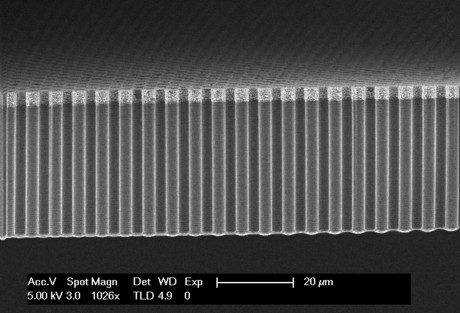Boosting solar fuel efficiency using microwires

Researchers from the University of Twente have made significant efficiency improvements to the technology used to generate solar fuels, involving the direct conversion of energy from sunlight into a usable fuel. Using only earth-abundant materials, the researchers developed what has been called the most efficient conversion method to date.
Scientists around the world are working on generating sustainable fuels using only sunlight, CO2 and water — the basic ingredients used by plants. The University of Twente researchers have now developed a method for converting light into hydrogen, avoiding the use of scarce and expensive precious metals in the process.
The system consists of silicon microwires less than one-tenth of a millimetre long, the tops of which are coated with a catalyst. The photons (light particles) are collected between the microwires. The chemical reaction in which hydrogen is formed takes place on the catalyst at the tips of the microwires.
By varying the density and length of the microwires, the researchers ultimately achieved a maximum efficiency of 10.8%. They achieved this by decoupling the site where the photons are collected from the site where the conversion reaction takes place. This is necessary because catalysts usually reflect light. Yet to make the conversion as efficient as possible, you want them to absorb as much light as possible. It is important to achieve this decoupling at the microscale, because at larger scales the conductivity of the silicon microwires becomes the limiting factor.
Professor Jurriaan Huskens, one of the researchers involved, states that 10.8% is the highest ever efficiency for a silicon-based design. A further increase in efficiency, to 15%, would make the technology economically viable.
This study has been published in the journal Nature Energy.
Molecular Velcro coating boosts solar cell efficiency
Researchers have developed a new coating layer that enhances the durability and efficiency of...
Predictive AI model enhances solid-state battery design
ECU researchers are working on ways to make solid-state batteries more reliable with the help of...
Boosting performance of aqueous zinc–iodine batteries
Engineers from the University of Adelaide have enhanced aqueous zinc–iodine batteries using...




